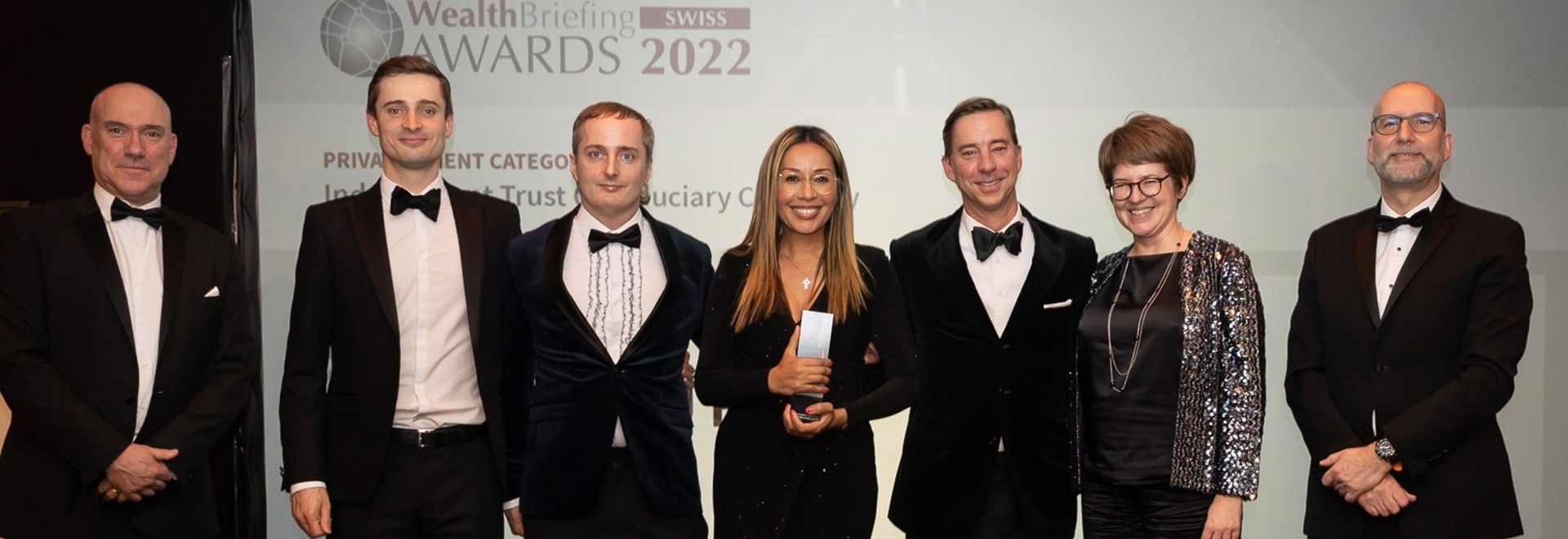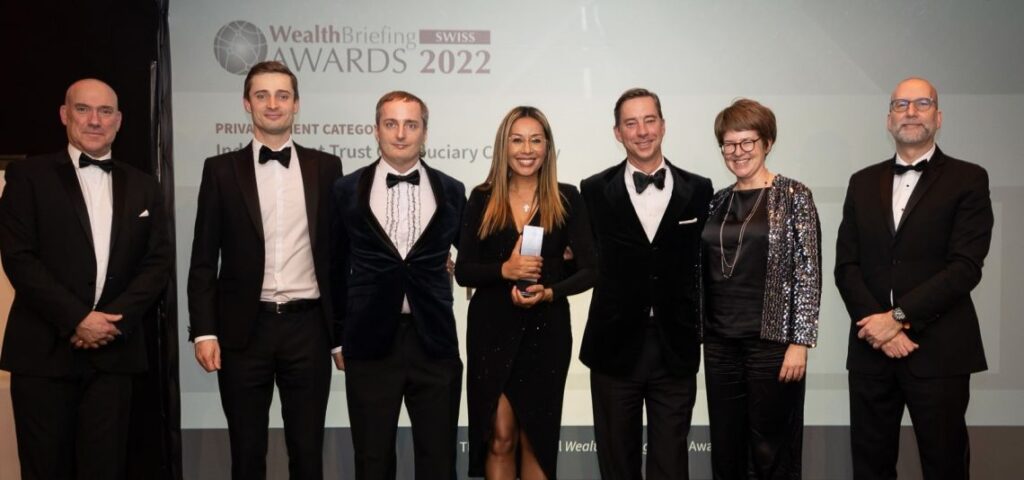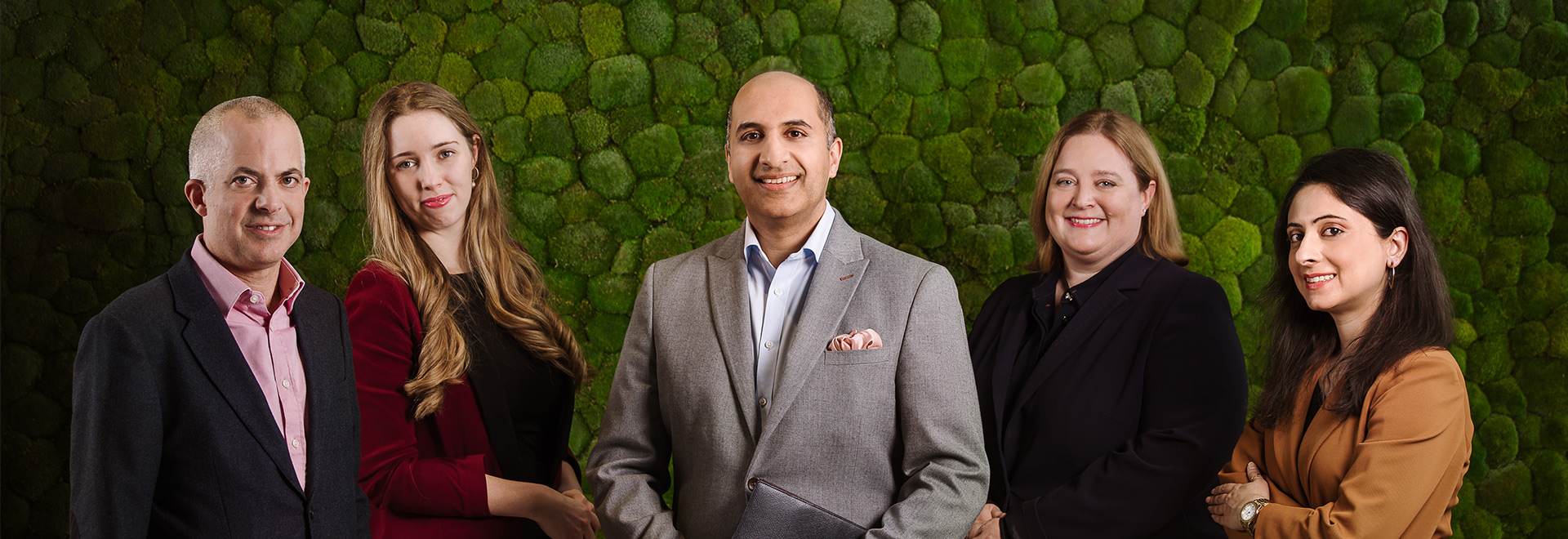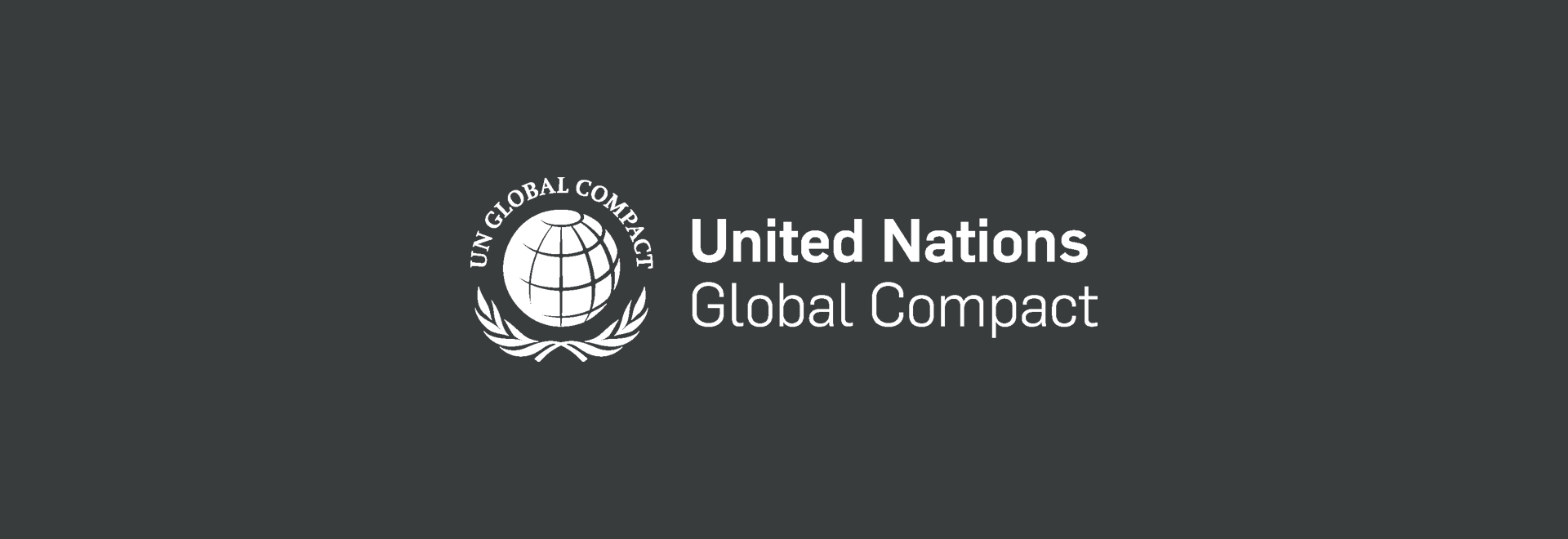You and Your Money: Estate Planning May 2022



We are delighted to announce Accuro’s recognition as ‘Highly Commended Independent Trust or Fiduciary Company’ at the tenth Annual WealthBriefing European Awards.
Showcasing ‘best of breed’ providers in the global private banking, wealth management and trusted advisor communities, the awards were designed to recognise companies, teams and individuals which the prestigious panel of judges deemed to have ‘demonstrated innovation and excellence during 2022’.
The panel stated: “Accuro were awarded Highly Commended in this category for their refreshing, value‐based approach to business that embraces their day‐to‐day business and strives to create purposeful climate for employment and positive contribution to society.”
Paul Douglas, Managing Director of Accuro Trust in Jersey, commented: “We are delighted and honoured that the Judges have recognised Accuro as being a purpose led trust business. We strive to be a positive force for families, society and our environment. We thank the panel for this independent authentication which is uplifting for our team who, despite the challenges presented by the pandemic, have worked incredible hard in this pursuit of this mission.”


We are thrilled to announce that Accuro was revealed winner at the Ninth Annual Wealthbriefing Swiss Awards 2022 in the “Independent Trust or Fiduciary Company” category for the third time since 2019.
Showcasing ‘best of breed’ in Switzerland, the awards have been designed to recognise outstanding organisations grouped by specialism and geography which the prestigious panel of independent judges deemed to have ‘demonstrated innovation and excellence during the last year’.
The judges said: “We are impressed with the high standing of new business acquired in the course of 2021 and the staff initiatives highlighted in the profile which ultimately was the reason for this years’ winning submission.”
Natacha Onawelho-Loren, Managing Director of Accuro Switzerland commented: “We are absolutely delighted at winning this year’s award. This is a tremendous recognition of the team’s hard work in delivering a high quality client service while internally implementing our doing well while doing good.”




Accuro is continuing to grow and define itself as an innovator in the private trust sector by expanding its London offering to regulated trust and fiduciary services and bringing on board a Chief People Officer for the Group.
Mustafa Hussain has been appointed as Managing Director of the Accuro London office, having joined Accuro in January 2019 from Taylor Wessing LLP, where he was a partner specialising in private wealth. Mustafa will also continue to bring his strategic insights and legal expertise to corporate governance, and will continue to co-chair the Accuro Group Board.
The appointment of Rebecca Hone, as a Chief People Office, underlines the growth agenda and the importance of people. Rebecca Hone has joined Accuro, in London, from Bupa where she delivered HR and people strategy within the insurance business, and led on a number of change and transformation projects. She brings extensive HR and management consultancy experience in financial services. Rebecca will also be joining the holding board to bring an additional perspective to strategic prioritisation, execution and decision-making for the group.
CEO and Co-Founder, Xavier Isaac commented, “Our people are our greatest asset, so the time is right to invest in a Chief People Officer to further integrate our people strategy with the business strategy. Rebecca brings a strong track record of strategy development and execution. Investing in Accuro’s London offering is a natural evolution of our organic growth strategy, and enables us to better serve our clients in this key location. I am delighted to confirm that this will be delivered under Mustafa’s leadership. This is a very exciting time for Accuro.”

Rebecca Hone

Mustafa Hussain

Kelly Watson – Client Services Director
Having qualified as a Barrister (non-practising) and Solicitor of England and Wales Kelly Watson spent five years in private practice in both England and Jersey before moving into the offshore finance industry in 2009. Kelly completed an advanced training scheme with an international bank-owned trust company, going on to work at an independent trust company prior to joining Accuro in 2021. Her legal background enables her to specialise in the administration of contentious, complex and / or distressed offshore structures, in particular those involved in litigation or under criminal or tax investigation. Kelly holds a Bachelor of Laws honours degree and the STEP diploma in International Offshore Administration. In her spare time she is a keen cyclist and opera singer.
Helen Hendy – Client Services Director
With a career spanning over 30 years in the Jersey private client industry, Helen Hendy brings additional strength and depth to the Accuro team, specialising in structuring for UHNW UK Resident and Non-UK domiciled families, PTCs, family governance and Family Investment Companies, and managing a wide range of asset classes for multi-jurisdictional, international client families. During her career, Helen has worked to executive board level with three previous fiduciary services providers including independent, bank-owned and PE backed businesses. Working closely in partnership with clients and intermediaries to achieve the desired structuring, generational wealth planning and philanthropic objectives, Helen is highly respected by the finance community for the strong and lasting relationships she builds with all parties. Helen is an Associate member of ICSA – the Chartered Governance Institute and holds the IOD Diploma in Company Direction.
Helen commented: “I truly believe I have found a business aligned with my own values, placing the client family and their objectives back at the top of the agenda and delivering a first class, personal service. Accuro recognises the importance of people and culture in driving success, both for our client families and our team. Together we are passionate in our commitment to be a top tier fiduciary services provider and trusted advisers to our clients whilst being mindful of our corporate mission to be a force for good in society.”
Paul Douglas, Managing Director of Accuro in Jersey, commented: “We are delighted to welcome Helen and Kelly to the Accuro team. They are both industry professionals of the highest calibre and they bring extensive experience in managing diverse and complex assets, working closely with client families and their advisors. We are pleased that our independent business model and distinct working environment is what has attracted them to Accuro and we look forward to this helping them to deliver client service excellence.”

Accuro is proud to announce its fourth win of the prestigious Trust Company of the Year (midsize firm) category at the STEP Private Client Awards 2021/22. Accuro has been shortlisted for the award every year since its inception in 2017, taking home the prize four out of the last five years.
Hosted by STEP, the global professional association that promotes excellence for private client professionals, this year’s virtual award ceremony took place on the 23rd September 2021.
STEP subjects all nominees to a rigorous judging process that considers their performance, values and contributions. Its awards are highly-coveted and are the top private client industry accolade.
Accuro stands out in this industry as an independent, fully management-and-staff-owned business, leading the way as a positive force for families, society and the environment, committed to developing long-term relationships and long-term change.
Since its management buy-out in 2017, Accuro has demonstrated its willingness to challenge the status quo and set a new standard in the industry. Attracting clients from across the globe and leading professionals to join its ranks, the business has grown organically into one which now operates from offices in Jersey, Geneva, Mauritius, and London. In 2021 Accuro has welcomed more new employees than ever before.
With a strong tradition of thought-leadership in the industry, a diverse client base, and a company structure that values and recognises the contributions of all staff members as integral to its overall success, Accuro truly lives up to its name: a trust company that cares.
The judges were impressed by Accuro’s focus on ‘values and client service’. In particular, they praised the support it provides its employees, its ownership model, its healthy annual growth figures and its commitment to its values. This includes legally binding changes to its articles of association committing to having a positive impact on society and the environment.
Accuro’s CEO, Xavier Isaac, commented: « The words of the Presiding judges are particularly pleasing because they recognise the relentless efforts of our staff in their pursuit of excellence in client services, while praising at the same time Accuro for applying more sustainable and forward-thinking business practices.”


We are delighted to announce that Accuro Fiduciary has joined the United Nations Global Compact and the UN Global Compact Network UK – a voluntary leadership platform for the development, implementation, and disclosure of responsible business practices.
With this announcement, Accuro is aligning its operations and strategies with universal principles on human rights, labour, environment and anti-corruption, and taking actions that advance societal goals embodied in the Sustainable Development Goals (SDGs).
Steve Kenzie, Executive Director, UN Global Compact Network UK said “We support business taking actions to advance the Sustainable Development Goals. We are delighted and encouraged by Accuro’s endorsement of our initiative.”
Xavier Isaac, CEO of Accuro commented: “As a company fully owned by its management and staff, we like to use our independence and freedom of action to promote the responsible stewardship of our business based on UN SDGs and sound universally accepted principles. We believe it is also in the best interest of our clients for us to do so.”
Launched in 2000, the UN Global Compact is the largest corporate sustainability initiative in the world, with more than 12,000 companies and 3,500 non-business signatories based in over 160 countries, and 69 Local Networks.
We encourage you to visit the UN Global Compact Network UK website to learn more about their work-streams.


Can we choose our dreams? From an individual perspective, this is a fascinating question and surely a difficult one to answer in a few short words. However, from a collective perspective, the answer to the same question, in a location like Mauritius, is a resounding ‘yes’. Why is such an affirmative response pertinent to Mauritius in particular? The rationale is clear and simple, when examined from the societal viewpoint.
As a reputable and region-leading International Financial Centre at the gateway to the African continent, the Republic of Mauritius is a microcosm of banking, professional and investment services. The island nation’s response to the Covid-19 pandemic has been one of unprecedented support and this has set the tone for how Mauritius is looking to its future. The dream or vision of that future is positively informed by an increasing appetite for and focus on environmental, social and governance (ESG) issues by the government and businesses in Mauritius.
Why Mauritius holds ESG close to its heart?
Although ESG is undoubtedly a rising theme all over the globe as we look to our post-pandemic world, Mauritius’ position as an island nation empowers us in particular to see just why these issues are so vital, and why they are firmly on the agenda of the Mauritius International Financial Centre.
Indeed, Mauritius is an island that sits amongst the unrivalled beauty of the Indian Ocean, with flora and fauna that is in many instances unique and exceptional to the locality. There could be no more visibly engaging reminder to international business of the importance of enshrining the need to protect this biodiversity and natural environment through commerce as well as through policy.
Environmental commitment is no longer exclusively the mandate of the philanthropic sector. The answer to addressing global problems lies in global solutions. After all, rivers and oceans know no boundaries and the flows of international business account for how strategic and commercial decisions have a wider impact on society and the environment. Consideration for these factors is encompassed within the stakeholder approach: mapping and then factoring in the impact and effect ‘in the whole view’ of commercial decisions.
Providing a framework for ESG
Addressing societal and environmental (not to mention good governance) needs and concerns cannot be haphazardly approached. Mauritius’ development in this regard looks to the framework of the United Nations Sustainable Development Goals or Global Goals. These are a collection of seventeen interlinked global goals designed to be a “blueprint to achieve a better and more sustainable future for all”. Notwithstanding that they were only formulated in 2015, they are intended to be achieved by the year 2030. That means there is actually very little time for making the dream a reality. This is precisely why private businesses will need to step up to lead alongside governments and charities.
In terms of the key steps taken to date along the path to sustainability in the financial sector, the Mauritian Government announced in the Budget 2020-21 that the Bank of Mauritius would come up with a framework for Blue and Green bonds, which led to the publication of a Guide on sustainable bonds by the Bank of Mauritius in June 2021. This Guide seeks to provide an overview of the requirements and process for the issuance of Sustainable Bonds and the listing of these Bonds on Exchanges licensed in Mauritius on the one hand, and to ensure the integrity of the sustainable financing ecosystem on the island on the other, to guard against ‘greenwashing’.
The Guide also highlights that one important lesson that can be learnt from the coronavirus pandemic is that ESG factors, sustainability and resilience are very important, both for markets and economies. It underlines that Sustainable Bonds are therefore more relevant than ever to help channel sustainable finance towards recovery and long-term resilience in a post-COVID world.
How the private sector is supporting such efforts?
More broadly, Mauritius is actively seeking to bring environmental and societal themes into its framework for international business. Not just looking internally within the island itself – Mauritius’ proximity to and business access for Africa means it necessarily and altruistically has a regional view in setting the tone here. Beyond steps taken for Blue and Green bonds, ethical indices, and sustainable pledges, one of the most forward-looking steps Mauritius is taking is encouraging private business to play its part.
In practice this may comprise the amendment of a company’s constitutional documents to provide for a stakeholder approach; or resourcing supplies locally in an effort to bring positive returns to local business and community. These are self-fulfilling practices, and they make for a positive vision, which is also a necessary one for humanity and planet Earth.
The science is clear in its stark prediction of how we will all be impacted by rising sea levels. Mauritius is all too aware of that, being an island nation. The local community is behind the ethos; evidence by citizen-led efforts to clean up oil spills and other similar self-starting initiatives. Such a praiseworthy local philosophy will increasingly filter through to the world of commerce. This is why an ESG approach is not just good for the planet and society, but also in tune with the substance of the locality. That makes for much more meaningful business.
Mauritius to forge ahead in its ESG journey
This entire field is a still a new one when it comes to harmonised international standards and there is a need for global regulations and legislation to clarify, platform and empower people and businesses looking to embrace this approach.
But every journey starts with a first step – and it is clear that Mauritius is a sound starting point to pursuing our collective dream of a more positive environmental and societal future for all.
Published on 19 August 2021 in Mauritius Economic Development Board

Published on 13 August 2021 by Andersen Mauritius